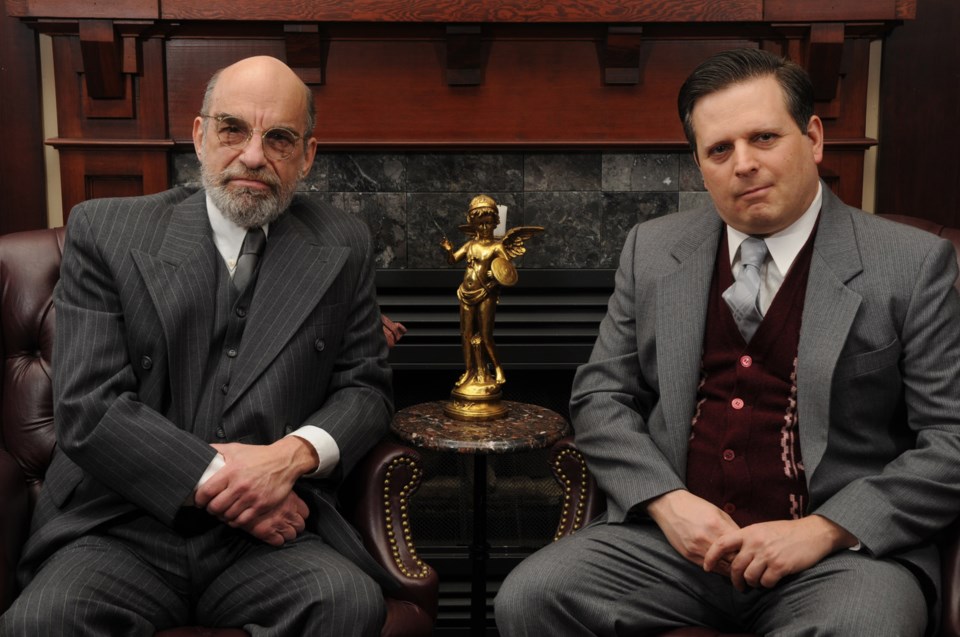Against the backdrop of impending war, two of the 20th century's keenest minds meet to discuss life's great questions.
Is there a God? Does goodness require the presence of evil? Can morality guarantee survival?
New Westminster theatregoers will have a chance to eavesdrop on the discussions between Sigmund Freud and C.S. Lewis when City Stage New West brings its latest production to the stage.
Freud's Last Session runs at Galbraith House from Jan. 28 to Feb. 9.
Mark St. Germain's play imagines a meeting between the famed psychoanalyst and the writer as the Second World War looms. Freud is dying of cancer, and he has summoned Lewis to his home to discover why the former atheist has converted to Christianity.
Chris Robson, who directs the production, says that although the meeting never in fact happened, the playwright has drawn much of his script from the writings and actual lives of the two men - starting by posing one question.
"What if these two minds met, and not just met, but met on the day England declares war on Germany," Robson explains. "It really charges the atmosphere behind the play."
The audience will be drawn in to the time period with radio broadcasts, planes passing overhead, even an air raid siren.
And, in the persons of actors Richard Newman as Freud and Damon Calderwood as Lewis, they'll also be drawn into the lives of the two men.
"I'm just thrilled, it's an ideal cast," Robson said. He notes that not only do the two actors bear some physical resemblance to the men they are playing, they also share certain qualities of personality and outlook on life. "They're so well-suited to these parts."
They're aided by a script that allows the two men to be not just intellectuals but real people, with childhoods and relationships and personal lives.
"What really attracted me to the play was the depth of humanity you see in these characters," Robson said. "These men are men, they're human beings."
Robson noted that the script delves into many of the big questions - centring, of course, around Freud's atheism and Lewis's late conversion to Christianity.
"Freud wasn't an atheist because he hated religion. He was an atheist because he felt there were a lot of harmful things it did," Robson said. "Lewis felt that religion game him, and people, a moral compass, a sense of right and wrong, a blueprint for living more humanely."
What the play doesn't provide is judgment.
"In a sense, they're both right, and they're both wrong," Robson said. "The best scripts, they don't provide you with answers, they fill you with questions."
Despite the weighty premise, Robson noted the play remains entertaining.
"There's a lot of surprising humour in the script," he said.
And, he noted, the audience experience is enhanced by the setting - in the dining room at Galbraith House, converted to Freud's study for the occasion, they will experience an intimate production that wouldn't be possible in a traditional theatre setting.
"The feeling will be of being a fly on the wall, it's that intimate a space," he said, noting the closeness to the actors adds an intensity to the performance. "I think the audience will be energized by it."
Moreover, he notes, though the play is historical in context, the issues it discusses are still timely for the 21st century.
"We're still dealing with people with conflicting ideologies and world views," he said, noting the big questions about religion and God are far from being settled in the public realm. "There's a lot of relevance there. A lot of these things are still being debated."
He believes the play will have wide appeal to many age groups because of the setting, the characters involved and the issues being debated.
"We're fighting for theatre to stay alive and stay relevant. It only does that by being good, and by being challenging," he said.
Robson said live theatre engages its audience in a way many other forms of entertainment don't.
"It really requires focus and thought on the part of the audience," he noted. "it's not tuning out for 90 minutes, it's tuning in."
*
Freud's Last Session runs Jan. 28 to Feb. 9 at 8 p.m. at Galbraith House, 131 Eighth St. Jan. 28 is a two-for-one preview night, with the official opening on Jan. 29.
Tickets can be purchased through www.brownpapertickets.com. For more information, see www.citystagenewwest.org.



